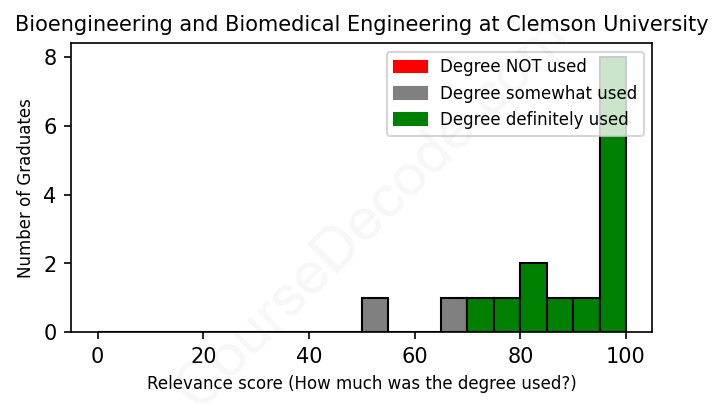
First, some facts. Of the Bioengineering and Biomedical Engineering graduates from Clemson University we've analyzed , here's how many have used (or NOT used) their degree in their career:

These are estimates based on AI analysis of 16 LinkedIn profiles (see below).
The verdict? Great! Overall, with an average relevance score of 88%, Bioengineering and Biomedical Engineering graduates from Clemson University have a substantially higher likelihood (+21%) of finding work in this field compared to the average graduate across all fields:
And for comparison, here's the chart for all profiles we've looked at across all degrees.
Also, after graduating, 68% of these graduates have pursued further education other than another Bachelor's degree (such as a Masters degree or other), compared to the average across all profiles of 35%. This suggests you may need more than just a Bachelors degree to be competitive as a Bioengineering and Biomedical Engineering graduate.
See the details:
|
Relevance score: 73% We think this person has gone into a career highly relevant to their degree. We think this person has gone into a career highly relevant to their degree.
DEGREE INFOGraduated in 2013 from Clemson University with a Bachelors Degree in Bioengineering and Biomedical Engineering. Also pursued further education since (see below). JOB HISTORY SINCE GRADUATIONCommunity and Health Development Volunteer/Small Business Development Advisor Peace Corps Jun 2013 - Sep 2016 Resident Prosthetist/Orthotist  Pacific Medical, Inc. May 2018 - Oct 2019 Certified Prosthetist Orthotist, Clinical Practice Manager  Pacific Medical, Inc. Oct 2019 - Aug 2022 ROMP Ambassador  Range of Motion Project Dec 2020 - Present Certified Prosthetist Orthotist  VA PUGET SOUND HEALTH CARE SYSTEM Aug 2022 - Present FURTHER DEGREES DONE SINCE GRADUATINGMasters DegreeNorthwestern University - The Feinberg School of Medicine 2016 - 2018 ABOUTPassionate about building things that build people.Exploring alternative solutions to providing mobility and medical technology access for those who need it. My background has brought various exposures both domestically and abroad to those with difficult access to these needed services and the disproportionate effects on quality of life. I am always looking to broaden my exposure and reach with creative solutions and learning alongside those on the same pursuit - whether that's prosthetic outreach solutions, healthcare management optimization, international disparities of physical disabilities, or various strategic endeavors - let's collaborate. |
The top 10 most common jobs done by the graduates we've analyzed (ranked most common to least) are:
When taking a closer look at the jobs held by graduates from Clemson University with degrees in Bioengineering and Biomedical Engineering, it becomes apparent that there is quite a diverse range of career paths. Some common positions include roles in regulatory affairs, such as Regulatory Manager and Safety Data Specialist, where professionals navigate compliance and safety regulations related to medical devices and pharmaceuticals. Many of these roles, especially at the managerial level, draw on knowledge gained during their studies but sometimes lean more towards organizational skills than pure engineering. Then there are those who have stepped into clinical roles, like Resident Physician or Certified Prosthetist Orthotist, which directly apply their engineering skills in patient care and medical practice, highlighting a stronger alignment with the core competencies of bioengineering.
Overall, while there are many positions that utilize bioengineering knowledge and skills, not every job listed is deeply technical or directly relevant to the core subjects learned in their degree. Some graduates end up in roles that focus more on regulatory affairs or project management, where a good understanding of bioengineering principles is beneficial but not always the main requirement. Yet, there are plenty of examples of graduates applying their education in meaningful ways, like as a Prosthetist/Orthotist or in research roles at medical institutions, showcasing the versatility of their degree in both healthcare and engineering-focused careers. So, while some paths diverge somewhat from traditional bioengineering roles, many still maintain a strong link to the foundational skills they developed during their studies.
Here is a visual representation of the most common words in job titles for Bioengineering and Biomedical Engineering graduates (this is across all Bioengineering and Biomedical Engineering graduates we've analyzed, not just those who went to Clemson University):

Graduates from the Bioengineering and Biomedical Engineering programs at Clemson University seem to have quite a promising career trajectory that often stays relevant to their fields. Right after graduation, many of them kick off their careers in roles like research assistants, regulatory affairs positions, and clinical settings, which align nicely with their education. For instance, roles such as Safety Data Specialist, Resident Physician, and various engineering or research roles indicate that they are leveraging their technical expertise from the get-go.
As these professionals move into their careers, about five or ten years later, they tend to climb the ladder into more senior positions such as Regulatory Managers, Directors of Scientific Affairs, and Clinical Practice Managers. This progression shows that they’re able to build on their initial experience to take on greater responsibilities and leadership roles. It’s encouraging to see that many have continued to work in areas connected to bioengineering, like prosthetics, pharmaceuticals, and medical writing. So overall, it appears that a degree in Bioengineering and Biomedical Engineering from Clemson equips students well for careers that are not just good jobs but are also directly related to their field of study.
Honestly, a Bachelor’s degree in Bioengineering or Biomedical Engineering can be pretty challenging, and it’s not just Clemson—this is a theme across most programs. You’ll dive into complex subjects like biology, chemistry, and advanced math, which can get pretty intense, especially with all the lab work and projects involved. It definitely requires a solid work ethic, good problem-solving skills, and a willingness to tackle some tough concepts, but depending on your interest and dedication, it can also be super rewarding! Whether it feels harder or easier than average often depends on your background and how much you enjoy the material. Just know that pacing yourself and seeking help when you need it can make a big difference in handling the workload.
Most commonly, in the LinkedIn profiles we've looked at, it takes people 4 years to finish a Bachelor degree in Bioengineering and Biomedical Engineering.
So, looking at these Clemson grads in Bioengineering and Biomedical Engineering, it seems like most of them have landed some pretty solid jobs after school, especially if you consider how diverse the fields are. The ones who went into medicine, like the resident physician, are likely making decent money—physicians usually pull in good salaries. Those who climbed the ranks in companies, like that Regulatory Manager or the Biomedical Engineer at Olympus, also seem to have built up some nice paychecks over time. Even though some of the earlier jobs were more entry-level or internships, it looks like many of them have moved onto roles with more responsibility and likely better salaries. However, the recent grads doing research assistant roles might not be making bank just yet, but they’re building experience that should pay off in the long run. Overall, I'd say they've got decent earning potential, especially as they gain more experience!
Here is a visual representation of the most common words seen in the "about" section of LinkedIn profiles who have a Bachelor degree in Bioengineering and Biomedical Engineering (this is across all Bioengineering and Biomedical Engineering graduates we've analyzed, not just those who went to Clemson University). This may or may not be useful:

Here are all colleges offering a Bachelor degree in Bioengineering and Biomedical Engineering (ordered by the average relevance score of their Bioengineering and Biomedical Engineering graduates, best to worst) where we have analyzed at least 10 of their graduates:
| College | Score | Count |
|---|---|---|
 Clemson University Clemson University
|
88 | 16 |
 University of Washington University of Washington
|
82 | 11 |
 University of California, Los Angeles University of California, Los Angeles
|
72 | 10 |